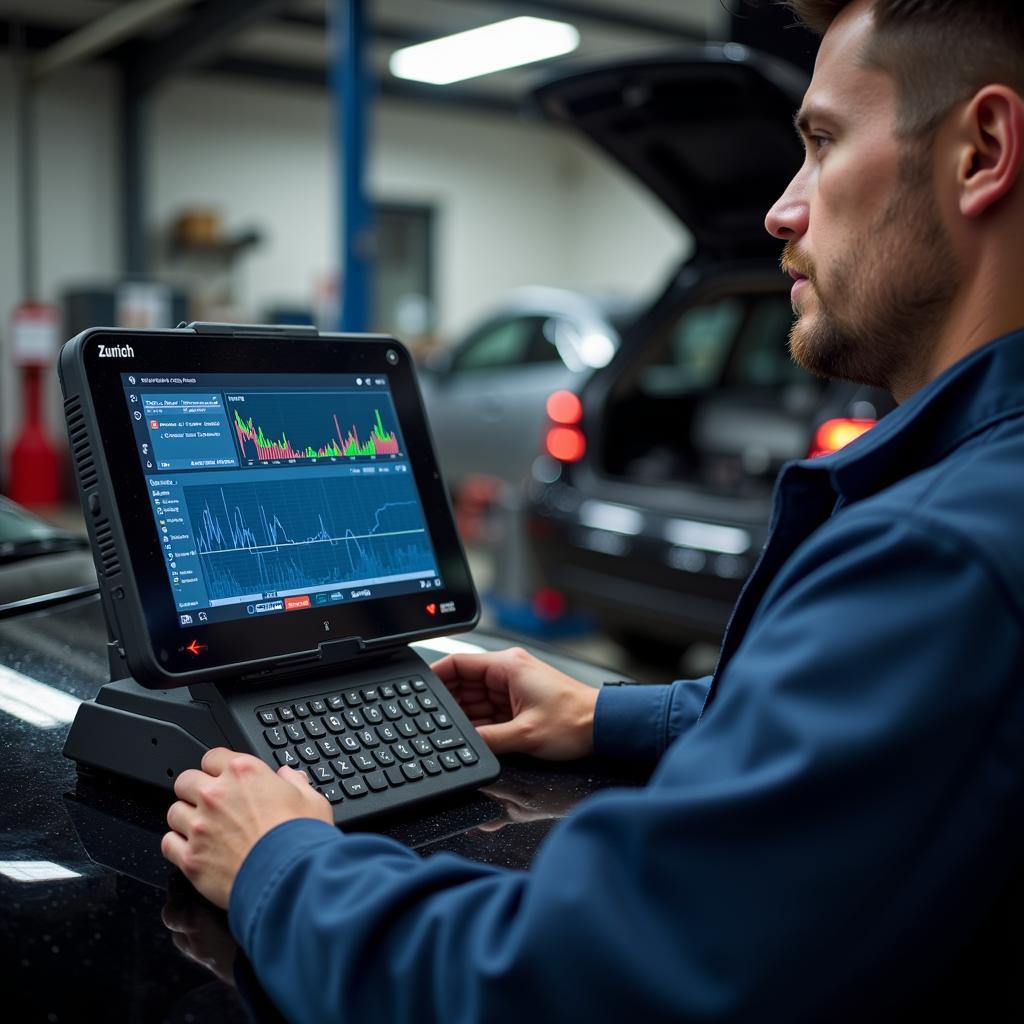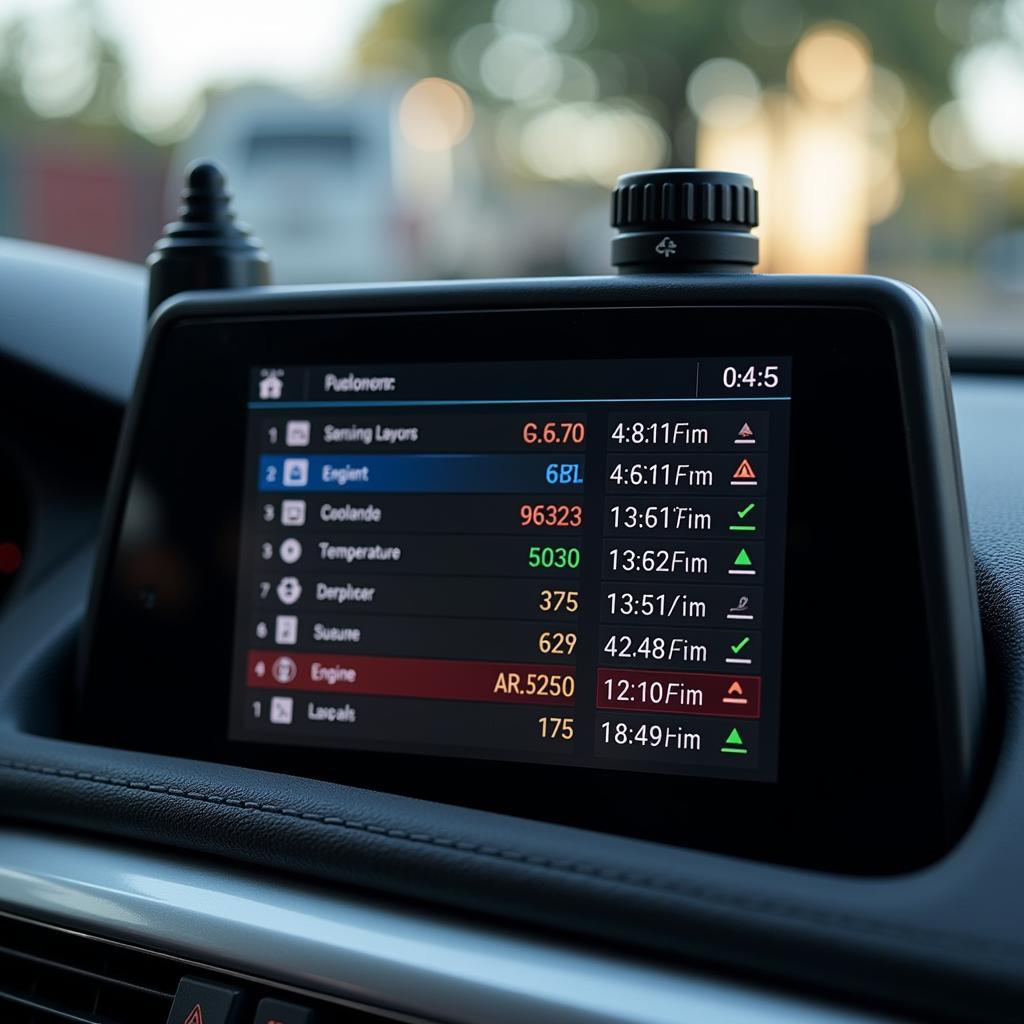The world of car repair has changed dramatically. Gone are the days of relying solely on a mechanic’s intuition. Today, even everyday car owners can leverage sophisticated technology like Zurich car scanners to diagnose and understand vehicle issues. This guide delves into the world of Zurich car scanners, exploring their benefits, features, and how they empower both DIY enthusiasts and professional mechanics in Zurich.
Unveiling the Power of Zurich Car Scanner Vehicles
Zurich car scanners are essentially powerful diagnostic tools designed to communicate with a vehicle’s onboard computer system, often referred to as the Engine Control Unit (ECU). This communication allows the scanner to retrieve and interpret vital data about the vehicle’s health, performance, and any potential issues.
These scanners provide a window into the complex world of your car’s electronics, offering insights that were previously inaccessible without specialized equipment and expertise. Whether you’re facing engine problems, transmission hiccups, or even airbag system malfunctions, a Zurich car scanner can be your key to identifying the root cause.
Why Choose a Zurich Car Scanner?
The benefits of owning a Zurich car scanner, especially in a bustling city like Zurich, are numerous and compelling:
- Early Problem Detection: Imagine being alerted to a minor issue before it escalates into a major (and expensive) repair. Zurich car scanners provide early warnings, allowing for timely intervention.
- Cost Savings: By identifying problems yourself, you can avoid unnecessary trips to the mechanic for simple diagnoses. This translates to significant savings on labor costs in the long run.
- Empowerment and Knowledge: Understanding your car’s health empowers you to make informed decisions about its maintenance and repair, potentially avoiding unnecessary services.
- Convenience: Modern Zurich car scanners are compact and portable, making it easy to perform quick diagnostics at home or on the go.
 Mechanic Performing Diagnostics with Car Scanner
Mechanic Performing Diagnostics with Car Scanner
Navigating the World of Zurich Car Scanners
The market offers a wide array of Zurich car scanners, each with its unique set of features and capabilities. Choosing the right one can seem daunting, but understanding your needs and the available options can simplify the process:
Types of Zurich Car Scanners:
-
Basic Code Readers: These entry-level scanners primarily read and clear basic diagnostic trouble codes (DTCs) stored in your car’s ECU. Ideal for DIY enthusiasts who want to understand and address basic car issues.
-
OBD-II Scanners: Building upon basic code readers, OBD-II scanners offer a wider range of data readings, including live data streams, sensor information, and emissions readiness checks. They provide a more comprehensive picture of your car’s health.
-
Professional-Grade Scanners: As the name suggests, these scanners are designed for professional mechanics and workshops. They offer advanced functionalities like bi-directional control, allowing mechanics to interact with and test various vehicle systems.
Features to Consider:
- Vehicle Compatibility: Ensure the scanner is compatible with your car’s make, model, and year.
- Data Parameters: Consider the range of data the scanner can access and display.
- Software Updates: Opt for scanners that offer regular software updates to ensure compatibility with newer car models and diagnostic protocols.
- User Interface: A user-friendly interface with clear navigation and data presentation enhances usability.
Mastering DIY Car Diagnostics with Zurich Car Scanners
Using a Zurich car scanner might seem intimidating at first, but the process is surprisingly straightforward, especially with modern user-friendly designs:
Steps for Effective DIY Diagnostics:
-
Locate the OBD-II Port: Typically located under the dashboard on the driver’s side, the OBD-II port is where you connect the scanner.
-
Connect the Scanner: Turn the ignition to the “on” position without starting the engine, and connect the scanner to the OBD-II port.
-
Read the Codes: Follow the scanner’s instructions to initiate a scan. The scanner will retrieve and display any stored diagnostic trouble codes.
-
Interpret the Codes: Each code corresponds to a specific issue within the vehicle’s system. Use the scanner’s built-in code library or consult online resources to decipher their meaning.
-
Address the Issue: Based on the code interpretation, you can attempt DIY repairs or consult a qualified mechanic armed with a clear understanding of the problem.
Empowering Car Owners and Mechanics Alike
Zurich car scanners have revolutionized car repair and maintenance, providing a valuable tool for both car owners and professional mechanics. By offering a deeper understanding of vehicle issues, these scanners enable proactive maintenance, informed repair decisions, and potentially significant cost savings. Whether you’re a seasoned DIY enthusiast or a professional mechanic seeking advanced diagnostic capabilities, a Zurich car scanner can be a valuable asset.
Need assistance choosing the right car scanner for your needs? Contact the experts at ScanToolUS today at +1 (641) 206-8880 or visit our office located at 1615 S Laramie Ave, Cicero, IL 60804, USA.
FAQs about Zurich Car Scanners:
-
Can I use any car scanner on any vehicle? No, compatibility is crucial. Ensure the scanner supports your car’s make, model, and year.
-
Are Zurich car scanners difficult to use for beginners? Not at all! Many modern scanners boast user-friendly interfaces, making them accessible even for DIY beginners.
-
What if I can’t interpret the diagnostic codes? Most scanners offer built-in code libraries or online resources are available to help decipher their meaning.
-
Can a Zurich car scanner fix car problems? No, they primarily diagnose problems. Repair actions may be required based on the identified issues.
-
Are Zurich car scanners only beneficial for newer cars? While most effective on newer vehicles with OBD-II ports, some scanners offer adapters for older models.
-
What are the long-term benefits of owning a car scanner? Early problem detection, potential cost savings on repairs, and increased knowledge about your car’s health.
-
Where can I get reliable information about choosing and using a car scanner? Reputable online resources, automotive forums, and experienced mechanics can provide valuable insights.

